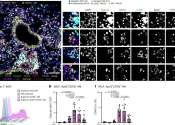How the immune system learns from harmless particles
Our lungs are bombarded by all manner of different particles every single day. While some are perfectly safe for us, others—known as pathogens—have the potential to make us ill. The immune system trains its response whenever ...
5 hours ago
0
8
